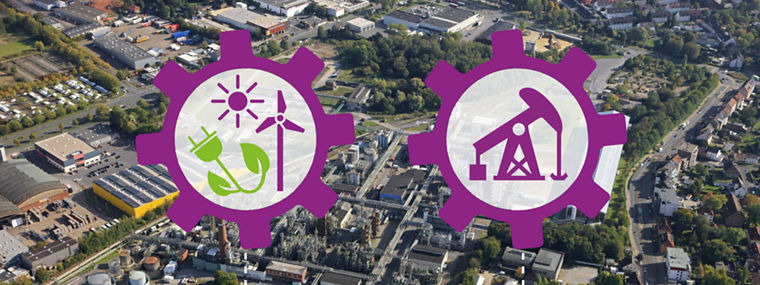The birthplace of Isophorone chemistry and a leader in sustainable production
In 1962 our Herne site in Germany became the birthplace of isophorone chemistry. Today, it continues to make history by spearheading our initiatives to reduce energy consumption and promote sustainable chemical production. As a cornerstone of Evonik's commitment to sustainability and climate neutrality, the "Herne Green Deal" aims to drastically cut emissions and transition the plant to operate entirely independent of fossil fuels. This ambitious project includes the elimination of fossil-based raw materials in our production processes, paving the way for a greener future in the chemical industry.
Join us on this journey towards a sustainable tomorrow, as we innovate and lead the way in eco-friendly chemical solutions.
Evonik: A sustainability role model in the Chemical industry
At Evonik, we have long been committed to supporting our customers with innovative products and solutions that pave the way for sustainable practices in environmental protection, climate action, circularity, and biodiversity. With our ambitious goal of achieving climate neutrality across the entire Group, we are investing €700 million in advanced production processes and infrastructure by 2030. This investment in next-generation technologies is designed to significantly reduce resource consumption and energy usage, ultimately lowering our carbon footprint and enhancing sustainability.
A key focus of this initiative is the transformation of our Herne Crosslinkers site, where we are dedicated to delivering more sustainable production by minimizing reliance on fossil-based resources. The green energy transition at Herne includes the production of our eCO series of products, which utilize renewable raw materials.
With the holistic approach of the "Herne Green Deal," our long-term ambition is to make the plant entirely independent of fossil fuels and fossil-based raw materials. By achieving this goal, the Herne site aims to become a shining example of sustainable production not only for Evonik but also for the global chemical industry as a whole.
Our sustainable district heating project
The Technical Options for Thermal Energy Recovery (TORTE) project captures waste heat from our isophorone production in Herne, converting it into district heating to local homes in Gelsenkirchen. This initiative can supply sustainable energy to up to 1,000 households in the Ruhr region, highlighting Evonik’s dedication to delivering sustainable community energy solutions. Read more...

The Herne site, featuring 17 production plants across 250,000 square meters, generates energy as heat during chemical production. As part of the climate-neutral "Herne Green Deal," the site aims to capture and reuse waste heat from cooling towers, redirecting it into the district heating network to reduce emissions and promote sustainability. As part of the "Herne Green Deal," the project aims to eliminate fossil fuels from our production processes and achieve complete independence from fossil-based resources.
The TORTE project received the "Responsible Care Initiative" award from the German Chemical Industry Association in late 2023, highlighting our commitment to sustainable chemical production. More about the Responsible Care Award
At Evonik, we are dedicated to leading sustainable practices in the chemical industry, benefiting our local community and setting new standards for eco-friendly production, all while striving for climate neutrality.
From waste heat to heating Homes - “Technical Options for Thermal Energy Recovery”
Evonik's Herne site uses a new heat pump to feed industrial waste heat from the site’s cooling towers into the district heating network
Unlocking green hydrogen for wind energy
Our H2annibal project, in collaboration with Siemens Energy, represents a significant leap in hydrogen technology. Inspired by the abandoned Hannibal coal mine, this pilot electrolyzer project aims to produce green hydrogen for sustainable isophorone diamine (IPDA) production at the Herne site. Launched in late 2022 and funded by the German Federal Ministry of Education and Research, the project will enhance operational efficiency and sustainability, supplying up to 45% of the site's hydrogen demand and 100% of the required oxygen. Read more...
This innovative PEM (proton exchange membrane) electrolyzer, rated at 8 MW, is estimated to prevent around 12,000 metric tons of CO2 emissions annually, supporting Germany's hydrogen economy and sustainability goals. The project is set to conclude in mid-2025, underscoring Evonik's commitment to innovative solutions in the energy sector.

